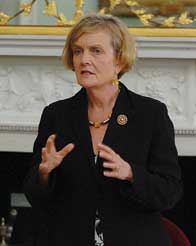 There has been a mixed reaction from the optical bodies and the GOC to the publication of the Government's White Paper on the radical shake-up of regulation of health professionals.
There has been a mixed reaction from the optical bodies and the GOC to the publication of the Government's White Paper on the radical shake-up of regulation of health professionals.
The Government announced the consultation following the inquiry into GP killer Harold Shipman which raised concerns about the way health professionals are regulated.
Some of the proposed key changes in the White Paper include a requirement for all regulatory bodies, including the GOC, to put in place arrangements for revalidation of their professional registration, by periodically demonstrating their continued fitness to practise. The Department of Health will discuss with the GOC and the optical professions the most appropriate arrangements for them.
Moreover, the burden of proof for fitness to practise cases will be judged on a civil standard of proof, with a 'sliding scale', rather than the current criminal standard.
There are also moves to ensure all regulators, including the GOC, have at least a 50:50 split between lay and professional members.
Health Secretary Patricia Hewitt said she hoped that the proposals would put an end to past controversies over the regulation of health professionals.
'The past decade has seen much debate, sometimes heated, about the future of professional regulation. The White Paper provides an opportunity to put an end to those debates.'
Commenting on the publication of the proposals, GOC chairman Rosie Varley said the White Paper signalled the end to a long period of uncertainty over professional regulation. 'Many of the proposals are an endorsement of the GOC reform agenda which has strengthened our role in public protection. We have already laid the groundwork for professional revalidation to be developed from the strength and success of our CET scheme. The steps we have taken to separate investigation and hearings functions and to introduce student registration also give us a head start.'
While welcoming the proposals, FODO chief executive David Hewlett, raised concerns about the additional bureaucratic burden on practitioners resulting from the changes: 'It seems that our call for a simple proportionate system for optics, overseen by the GOC, has been heard, although we would be very wary of PCT involvement as our experience is that that bureaucratises everything. We will scrutinise these proposals to ensure they do not present unreasonable burdens on optical businesses,' he said.
The Association of Optometrists also voiced concerns about the implications for fitness to practise hearings.
'The recommendation for the civil standard of proof in fitness to practise cases is a retrograde step. We must ensure that a system which can fine practitioners and businesses works fairly for both patients and practitioners,' said chief executive Richard Carswell.
ABDO secretary general Sir Anthony Garrett expressed disappointment that members would be expected to conform to a national standard without the due recognition from the Department of Health. 'Dispensing opticians are still in an inequitable position with the burden of regulation yet without being properly recognised as part of the NHS. We will work with the other bodies to ensure these proposals are workable for dispensing opticians,' he said.
The announcement was welcomed by Bryony Pawinska, chief executive of the College of Optometrists. 'Optics has always been at the forefront of professional regulation and the College has a major role in this,' she said. 'We will work with the GOC and other optical bodies to ensure the changes benefit both patients and practitioners.'
